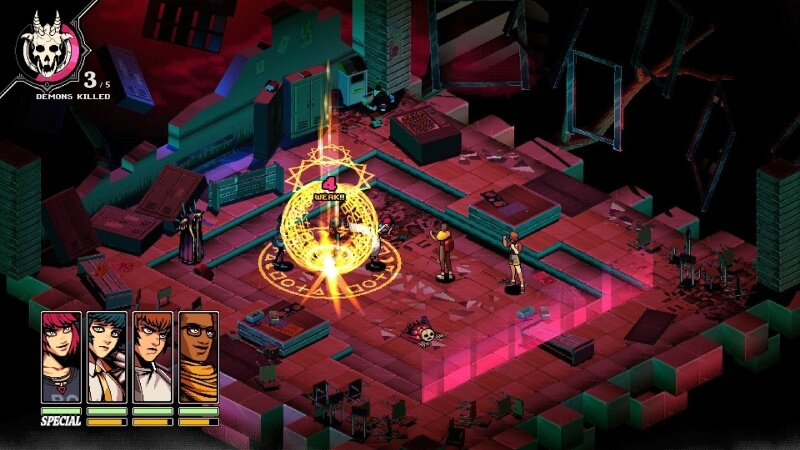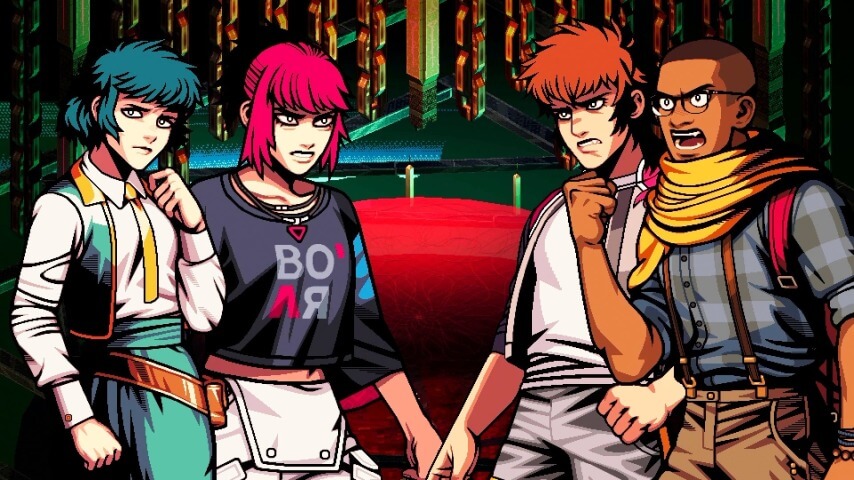School can be hell. The workload can be overwhelming. The threat of a plummeting GPA hangs over every misstep. There’s the constant pressure to make new connections and friends. Maybe even spark up a relationship. Most even have to juggle these responsibilities with a job and a busy home life these days. Throw in some demon-hunting, not to mention an impending apocalypse and the occasional bit of karaoke, and you’ve got Demonschool, a hell of a game in search of a truly phenomenal one. It’s an A+ effort for a C- game.
The thing is: Demonschool‘s got all the makings of a truly great one of these games—this growing crop of RPGs that simulate and blend social mechanics like calendars, chores, and relationships with the tried-and-true formulas of turn-based combat and buildcrafting—and that’s in large part due to the fact that it is an exemplary student. Its learning is incredibly self-evident upon any degree of scrutiny. The school setting is an obvious touchstone of the Persona series, while the slice-of-life elements and oddball denizens of Hemsk Island are not only reminiscent of it but also of the comic tendencies of the Yakuza games. Its eagle-eye perspective harkens to the lineage of strategy games writ large, while its snappy, motion-based tactical action takes very specific notes from the mech and kaiju battles of Into the Breach. There’s tons of good breeding here.
In tone and style, Demonschool stretches beyond the world of games. Its central mystery—an island full of amnesiacs, shady institutions, and dubious figureheads, as well as demons—has notes of Suspiria, a film that serves as a bit of connective tissue to the spectrum of giallo films (a uniquely Italian predecessor to the modern slasher) which inspires Demonschool’s campy-yet-suspenseful ambiance, not to mention its oodles of blood and viscera.
This rich and stylistic lineage, which Demonschool contentedly draws upon and plays with, lends it a feeling unlike much else available these days. It is playful in its deployment of constant horror tropes and creatures. However, while it owes so much to these varied inspirations, it rarely steps out from under their shadows to mold these pieces into something uniquely Demonschool. Its studious nature comes through in spades and it’s an extraordinarily well-read pupil—Demonschool is a slick package, one that feels great to play and is awesome to look at and listen to—but it does fall short of superseding its teachers. It makes the grade, but it doesn’t quite graduate with honors.
That’s because at just about every turn, Demonschool punts on the opportunity to do something cooler, something more inventive, than playing the hits. Take its bevy of sidequests. Given the wealth of horrific tropes that Demonschool pokes fun at, there’s ample opportunity here to play with structure and scenarios. A haunted house, an exorcism of sorts, maybe even a murder mystery. At times, Demonschool even flirts with these possibilities, like a quest where a character keeps chancing upon haunted appliances, like a karaoke or copy machine. But rather than write something both compelling and fun (or, in Demonschool‘s case, funny) it often defers to the punch line—in this case, that of a stereotypically aggressive character stabbing inanimate things and chancing upon demons to fight-–and throws the player into a combat scenario with little fanfare or actual fun to be had.
On that note, Demonschool is actually negatively dense with combat. For a system that doesn’t evolve much throughout—I found winning combinations of party members fairly early on and the game provided them little resistance once they had certain skills equipped—all routes sure do lead to the same place, and that is seemingly never-ending gauntlets of encounters that quickly grow rote and stale. Every now and then, Demonschool throws in a new enemy unit that mixes things up, but between static win conditions (“Kill x number of demons,” or one of the game’s admittedly great bosses, in a set number of turns) and the sheer number of fights that this bad boy contains, their fun tricks hastily become just another cumbersome obstacle.

Instead, I would’ve rather had literally dozens more cutscenes and lines of dialogue between Demonschool‘s cast. That or a richer pool of extracurriculars than the one it currently features. Anything that could lend Demonschool the distinctive milieu and atmosphere it lacks.
Side activities, like a fishing minigame, as well as cooking and karaoke, are barebones distractions. The former pads out a game-long sidequest with a thin and repeatable mechanic, and the latter two are hardly more enticing. At least those progress Demonschool‘s equivalent of a social link system, which once again sees players progressing through character-specific sidequests and growing close to the game’s expansive party, which includes 15 playable characters. Few really offer any deeper understanding of the game’s vibrant gallery of shockingly one-note characters with surface-level characterization, including preeminent himbo Destin and future Letterboxd power-user Knute.
In missing the mark with this kind of material, Demonschool seems to mistake what makes its forerunners so magical. I have historically loved the social links of Persona games because those games at least try to explore and complicate those characters. Whether you think it succeeds or not, the games designate the supporting cast with symbols and titles, such as those found in tarot card readings, which seem to pin them down and assign a stereotypical role before then peeling back those layers across lengthy, engrossing, self-contained, and supremely melodramatic arcs. The numerous zany substories and activities littered throughout Kamurocho often put names to faces and reflect a texture and diversity to the human experience that make Yakuza games feel like a snapshot of an actual city corner, not some poor simulation of the thing.
Demonschool seems to confuse the monotony of these down moments, these study breaks and occasional stumbles into other people’s unique worlds, for filler meant to be cut and replaced with zingers and fights. In reality, they’re loving contrasts that round out the virtual lives we lead, just like in reality. They also functionally break up the monotony of just wailing away on gangsters and demons, which seems to be about the only thing Demonschool actually is interested in.
Demonschool neither commits to their depth, nor successfully remixes them into its own thing. Instead, it languishes in some awkward limbo partway between the two. By comparison—and look, I get that this is a game likely made on a shoestring budget compared to the titans I’m invoking—Demonschool‘s quest-givers are often faceless and nameless. Its most memorable NPC in my eyes is nothing more than a joke: a tiny gangster (game’s words, not mine) who says, you guessed it, “Hold me closer.”
I kept waiting for Demonschool to really impress me, especially in its writing. I wanted to fall for its demon-hunting crew and find myself entranced by its take on demonology. I wanted to study up on devils and ghouls alongside them, perform cool rituals, and maybe even learn awesome new slaying techniques. I wanted, maybe even expected, it to sweep me off my feet with a rich and constantly evolving fiction. Instead, what I got often felt like pastiche—well-intentioned, and lovingly handcrafted, but misshapen and hollow all the same.

 Keep scrolling for more great stories.
Keep scrolling for more great stories.

